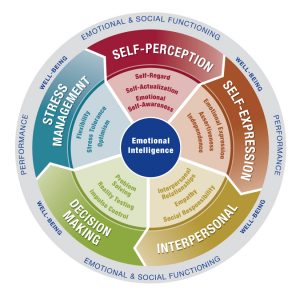Emotional Intelligence
The amount of change we’ve all had to cope with over the last few months has been quite extraordinary. Who would have thought when we returned to the office after the Christmas break, that by mid-April we would be dealing such disruption to our daily lives?
Of course, people respond to change in a myriad of ways. Some people thrive, finding the change process exciting. For others change is threatening and they have difficulty adapting.
When we have change on the scale that we are experiencing now – where the line between work and home becomes more and more blurred; where our Friday night drinks is held over Zoom instead of at our local; and the prospect of returning to ‘normal’ lingers somewhere ahead in an unknown future – we are likely to see a range of reactions from our colleagues and team members.
While some may be anxious and quick to anger, you may notice that others are looking calmly ahead at all the challenges we are facing, working steadily and without fuss to find a way forward. Despite the upheaval they are not getting frustrated or upset; they are trusting their intuition, making decisions, and steadily getting on with it.
These people are likely to have a high level of Emotional Intelligence.

Emotional Intelligence or EQ refers to the ability to recognise and control our own emotions and to understand how they affect those around us.
Emotional Intelligence is a key ingredient for leadership success, never more so than in a crisis. A leader that stays in control of their emotions can calmly assess a situation and lead the team through a response. They put their own egos aside to foster a safe environment for the team, where people feel comfortable putting forward their ideas, opinions and concerns. Ultimately, they provide their team with a sense of calm and a predictable environment in a world of chaos.So, what does emotional intelligence look like?
It is generally agreed that a leader with emotional intelligence will have the following five qualities:
- Self-Awareness
This is about recognising emotion ‘as it happens’ and always being aware of how we feel. We understand the impact of those feelings and how our actions effect those around us.
- Self-Regulation
It is difficult to control when we experience emotions, but we are in control of how long an emotion lasts. Self-regulation keeps us committed to personal accountability and stops us making rash decisions that compromise our values.
- Motivation
As a self-motivated leader we work consistently toward our goals; we motivate our employees and have extremely high standards for the quality of our own work.
- Empathy
Empathy is about recognising how others feel and taking their unique perspective into consideration. The better we are at discerning the signals from others, the better we can control the signals we send to them. Leaders can provide criticism to their team without crushing them. Leaders with empathy will also regularly seek feedback on their own performance.
- Interpersonal or Social Skills
Highly developed interpersonal skills play an essential role in our ability to influence; to act as a change catalyst; to manage conflict and to collaborate successfully. And as we talked about previously, it also underpins successful communication.
Whilst people skills have always been important, they have become increasingly so over the last couple of decades as the internet has put technical knowledge at people’s fingertips and the role of the technical expert has changed.
Interpersonal skills are no longer just the remit of people managers; they are skills required by us all.
If you’d like to learn more, our Diploma of Leadership & Management includes this topic as unit or book into one of our Emotional Intelligence programs, please contact us.

